Hi Everyone,
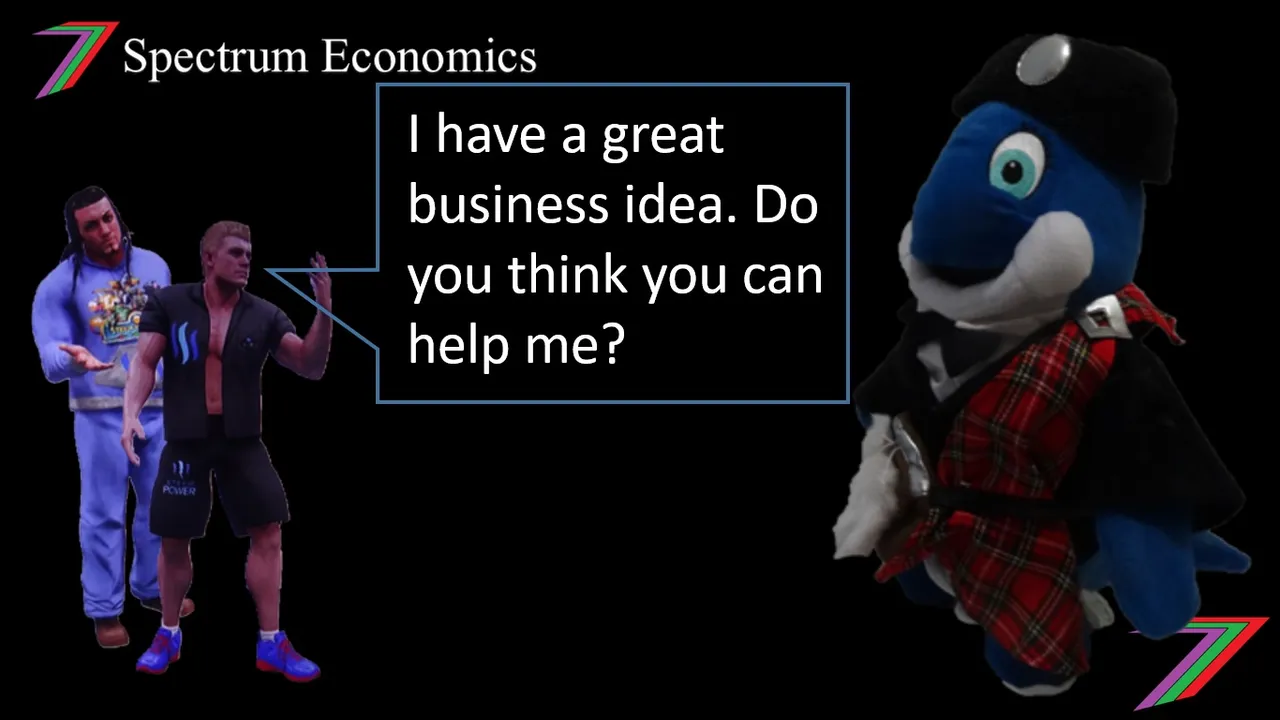
Entrepreneurship is one of the four factors of production described in economics. In my post, ‘Scarcity (Part 4) - Labour, Capital, and Entrepreneurship’ and video ‘Scarcity Video 4 - Factors of Production (Labour, Capital, and Entrepreneurship)’, I discuss entrepreneurship in the context of scarcity. I strongly support entrepreneurism and I believe it is the most undervalued of the four factors of production. In fact, some economists do not even consider entrepreneurship a factor of production.
What is entrepreneurship?

An entrepreneur is a person who launches and then runs a business. An entrepreneur is a risk taker who invests both his/her time and money into a business. Returns from a self-launched business venture is uncertain and often not immediate. According to fundera.com, 50% of small businesses fail in their first 5 years; these numbers have remained fairly consistent over time. Considering the high risk of failure, the potential for profits need to be higher than what the entrepreneur could have earned in a stable job (opportunity cost of entrepreneurship).
Surviving and thriving

As mentioned above, entrepreneurship is risky. In most cases, an entrepreneur must compete to survive and then to thrive. In many cases, this creates a survival of the fittest contest. The strongest firms survive and weakest fail. The strongest can be defined in many ways. It could be the most profitable firms (high revenue and/or low cost). It could be the firms with the deepest pockets (richest or largest). It could be the firms with the most influence (political and/or business connections).
Many new entrepreneurs do not have deep pockets or influence. Instead, they often have a combination of innovative ideas, passion for the product/s and/or service/s they offer or will offer, and a vision for the direction they want to take their business. The above attributes do not guarantee success or even form part of a formula for success. Instead, the above needs to result in their firm becoming profitable. If they are unable to obtain financial support, they will need to be profitable sooner rather than later. To obtain financial support, the entrepreneurs need to provide a strong case that they will be profitable in the future. In a world without intervention (Government), success eventually comes back to sustainable profitability.
Why do we need entrepreneurs?

The success of an entrepreneur depends on the eventual (sometimes immediate) ability of the entrepreneur to make a sustainable profit. Profit can be described as the excess revenue over cost during a period of time. To obtain revenue, there needs to be demand for the product/s and/or service/s provided by the business. In other words, entrepreneurs need to be offering something people want or need. The success of the entrepreneur depends on it. The other side of the equation is cost and supply. To make a profit, costs need to be kept reasonable and supply needs to keep up with the demand. There is no point having demand for a product, if a sufficient quantity cannot be produced at a sustainably low price.
Many businesses are demand driven; a high demand enables the business to reduce costs through economies of scale. Therefore, this enables firms to further increase profitability as they grow. If a business is unable to meet the demand or unable to maintain low costs, a competitor is likely to be able produce the product that is in demand at a lower cost. This will also enable the competitor to lower the price. Hence, another wider benefit of entrepreneurship.
From the above paragraphs, the benefits of entrepreneurship (new) can be deduced and summarised as follows:
- People's needs and wants can be more adequately met.
- There is greater product variety.
- There are lower costs for surviving and thriving firms.
- There are lower prices for consumers.
- There is incentive for existing firms to maintain higher quality products
- There is incentive for firms to innovate to meet new needs and wants.
Why do start-ups/small businesses fail?
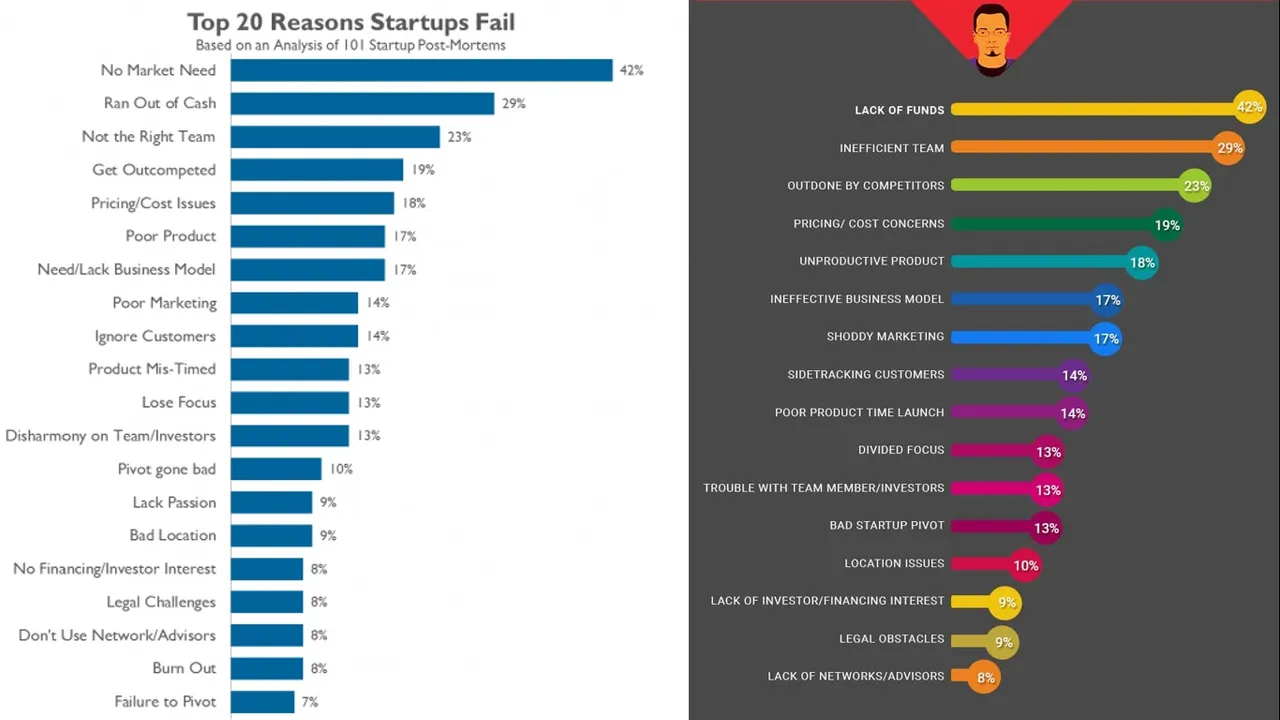
Source: fortune.com (left-hand side) and websolutioncentre.com (right-hand side)
There are many reasons start-ups and small businesses fail early on. The above lists contain the most cited examples from entrepreneurs. In most cases, the quality of the product is not the cause of failure (less than 20% in both lists). Instead, the main problems relate to lack of funds and lack of entrepreneurial skill (i.e. no market need, not the right team and outcompeted). I have discussed the importance of competition and the influence it has on determining the surviving and thriving businesses. However, some businesses fail when maybe they should not have. Some of these businesses have products that have potentially very high demand but they have failed because they were unable to establish themselves, this is evident from the main reasons given for failure.
Entrepreneurs helping each other
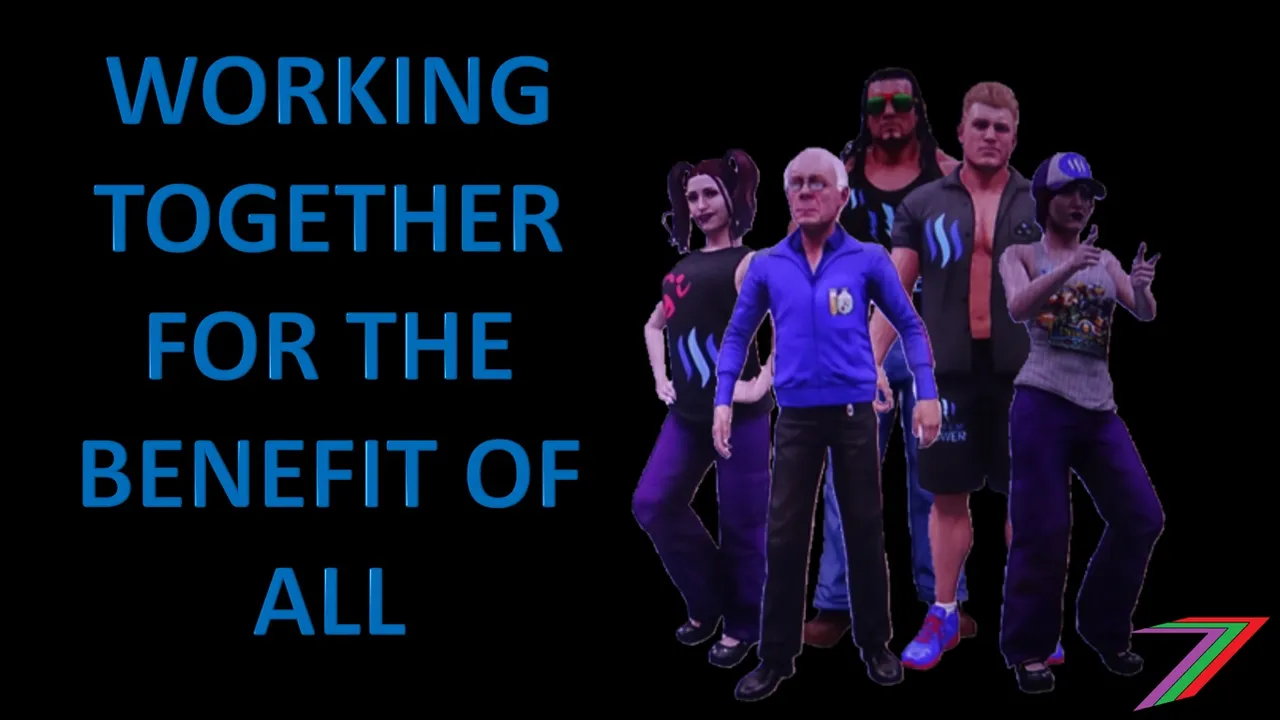
I believe businesses need to both compete and cooperate with each other. There is always great emphasis on competition but cooperation is just as important. Small firms can help each other succeed by sharing knowledge and resources. In my post, ‘Scarcity (Part 4) - Labour, Capital, and Entrepreneurship’, I describe examples in the Lumezzane Valley, Italy and Chiang Mai, Thailand. In both these regions, entrepreneurs have been able to thrive because of the favourable environment supporting entrepreneurship. I have also mentioned in several other posts of the benefits of open source research and knowledge sharing.
Shark Tank and Dragon’s Den

I also find the ideas behind television shows such as Shark Tank and Dragon’s Den intriguing. Both these shows are aimed at helping entrepreneurs. These shows typically have a panel of very successful and established entrepreneurs (sharks/dragons). New and budding entrepreneurs come on these shows to pitch their businesses, products and ideas. The sharks/dragons will make offers if they are interested in becoming involved in the proposed business. These offers could include money, expertise, relevant contacts and exposure, and/or loans in exchange for equity, interest payments, and/or royalties.
The entrepreneurs benefit from the extra money as well as the experience and contacts provided by the sharks/dragons. The input from the sharks/dragons offers solutions to the two highest reasons start-ups fail. The entrepreneurs also benefit from the publicity from simply being on the show even if they do not get a deal. The sharks/dragons benefit from potentially very profitable business ventures that just needed an extra push to take off. Everyone else benefits from the greater availability of great products that may never have seen the light of day if not for the influence of the sharks/dragons.
Whale Tank (Steem related content)

I have over 120,000 Steem Power. I consider this quite a sizeable investment in the Steem Ecosystem. I am approximately a quarter of the way to being a whale (500,000 Steem Power). The above gif, which I originally introduced into my post ‘To Power Up or not to Power Up, that is the question’ was mostly for fun but I also hope has stimulated some thought in regards to supporting investment in Steem. In my post, ‘Ideas for profit sharing with Steem DApps’, I discuss using externally raised revenue to reward investor delegation to DApps. I believe there is room for further ideas in regards to delegating Steem to initiatives. Everyone on Steem is an entrepreneur to a certain extent. Therefore, everyone should be thinking of how he or she can build his or her brand as well as the wider ecosystem. Not every major investor has the time to earn by curating content. New ways of utilising Steem Power to make the ecosystem grow should always be welcome and explored. There could be room for some form of 'Whale Tank' on Steem.
More posts

If you want to read any of my other posts, you can click on the links below. These links will lead you to posts containing my collection of works. These posts will be updated frequently.
Economics Udemy Course
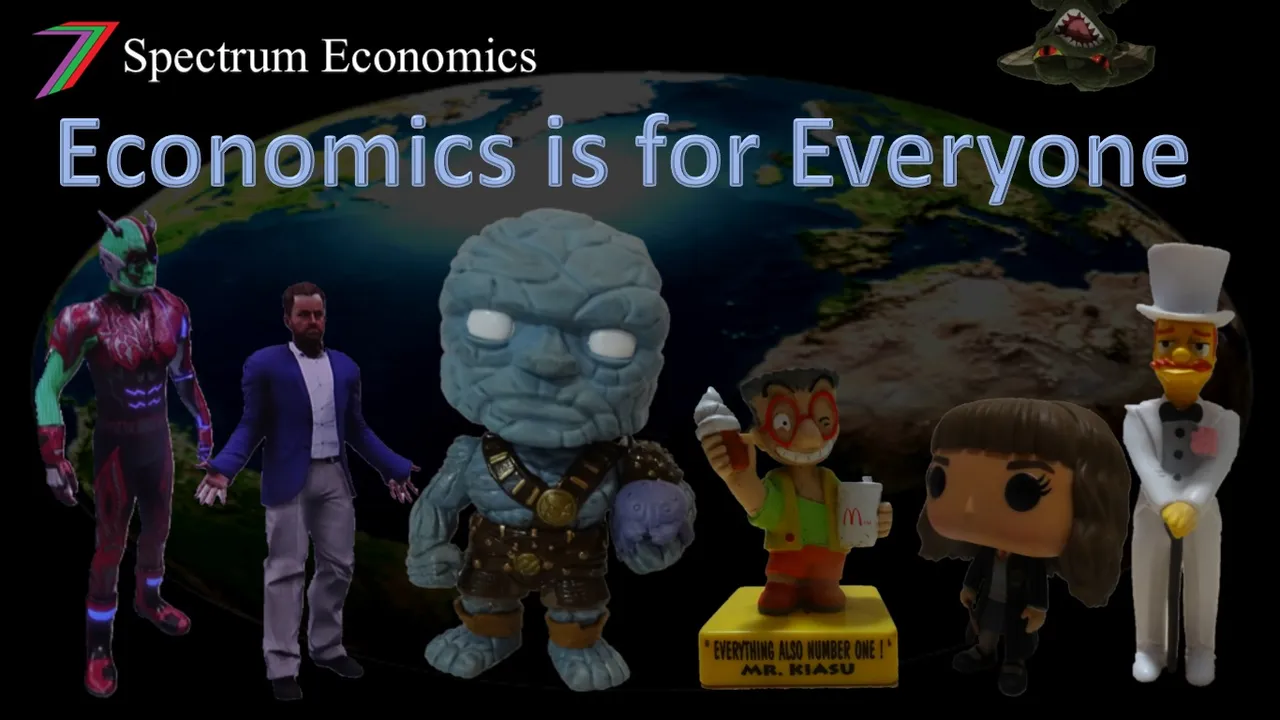
I have launched my first Udemy course ‘Economics is for Everyone’. The course focuses on how economics affects everyday people, the decisions they make and how they interact with the world around them. The course contains 24 video lectures (about 4 hours of viewing), 64 multiple-choice questions (3 at the end of most lectures), 32 downloadable resources (presentation slides, additional notes and links to relevant Steem posts), and 2 scenario questions. The course is currently free-of-charge. Click the link above to access the course.
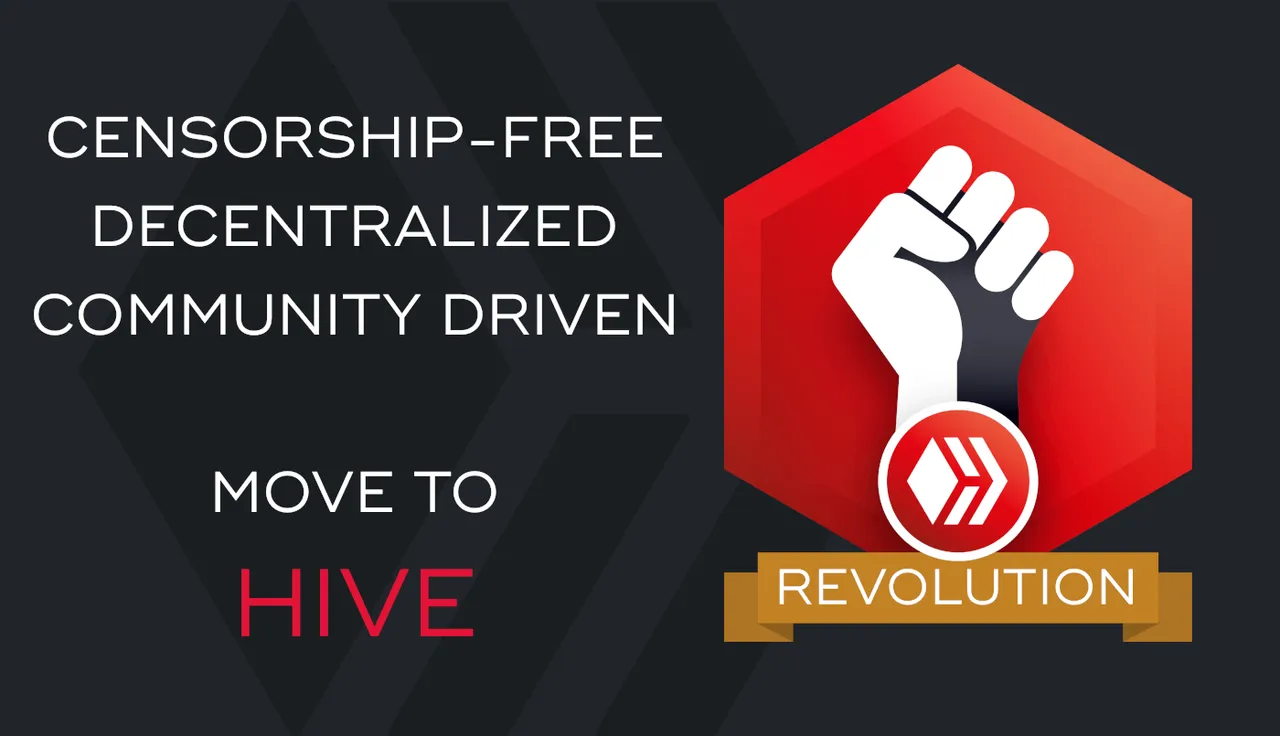



Steem - The Future of DApps



